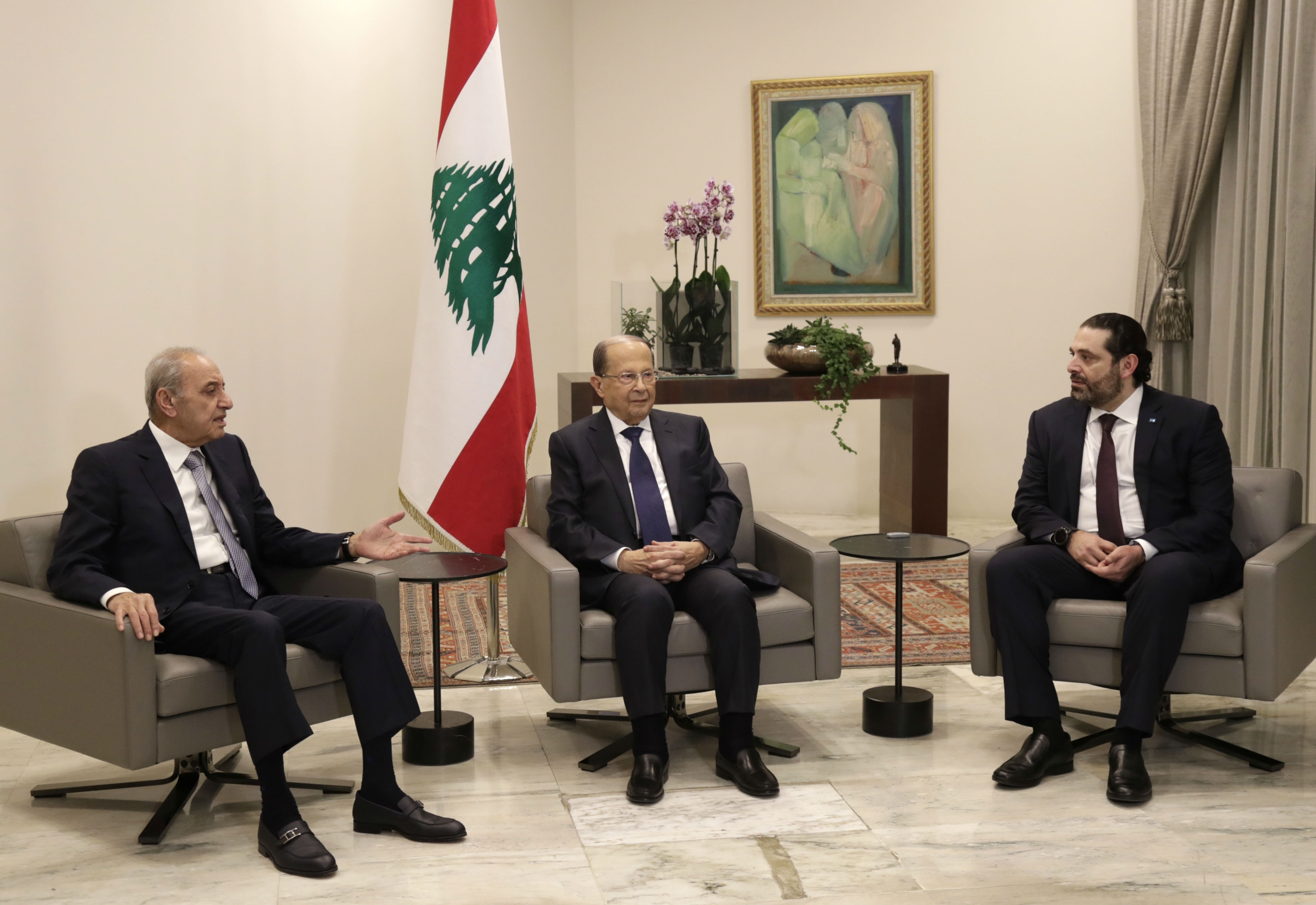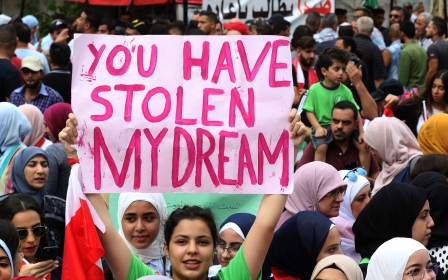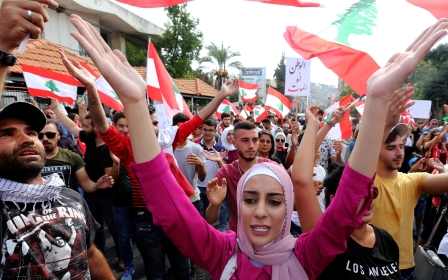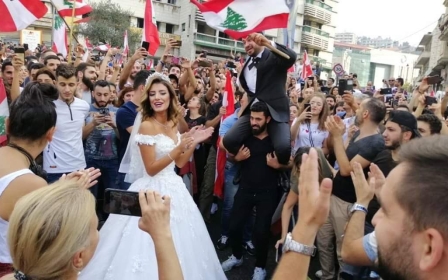'All of them means all of them': Who are Lebanon's political elite?

From Tripoli to Tyre, and Beirut to Baalbek, Lebanese have been chanting the same slogan: “All of them means all of them.”
Since its independence, Lebanon has been ruled by a clique of politicians and political families who have used sectarianism, corruption and clientelism to cling to power and amass incredible wealth.
Now protesters are calling for them all to be removed, from Hezbollah’s Hassan Nasrallah to Prime Minister Saad Hariri, with nervous responses from the leaders themselves.
Middle East Eye takes a quick look at some of the more prominent figures and parties in the protesters’ sights.
Prime Minister Saad Hariri and the Future Movement
New MEE newsletter: Jerusalem Dispatch
Sign up to get the latest insights and analysis on Israel-Palestine, alongside Turkey Unpacked and other MEE newsletters
The Hariri family was once the darling of Saudi Arabia, but apparently no longer.
Saad Hariri’s father Rafic made a fortune as a contractor and fixer in the kingdom, and was Lebanon’s dominant post-war political figure. Saad attempted to take that mantle as head of the predominantly Sunni Future Movement in 2005, when Rafic was assassinated.
Despite a lot of material support, Riyadh found itself dissatisfied with the younger Hariri and his apparent inability to counter Hezbollah.
The rise of King Salman in 2015 saw Hariri fall out of favour, and even detained in Riyadh and forced to resign temporarily in an extraordinary and embarrassing turn of events. Hariri’s political fortunes have dovetailed with his financial ones, with the many businesses he owns struggling to pay employees as contracts in Saudi Arabia run dry.
Weakened in the 2018 elections, he remains prime minister, but one with little power.
President Michel Aoun, Foreign Minister Gebran Bassil and the Free Patriotic Movement
Aoun is one of Lebanon’s many leaders who played an active and violent part in the country’s 1975-90 civil war.
As head of the army in the war’s latter years, Aoun fought bitter conflicts with the occupying Syrian military and the Lebanese Forces paramilitary headed by his rival, Samir Geagea. In 1989, Aoun found himself besieged in the presidential palace in Baabda, where he now resides as president, and fled besieging Syrian troops to the French embassy, which granted him exile.
Following the Syrian pull-out in 2005, sparked by Hariri’s assassination, the famously anti-Syria Aoun returned to found and lead the Free Patriotic Movement (FPM), only to switch sides and make a pact with Damascus ally Hezbollah that has held ever since. That alliance helped propel the former general, now 84, to the presidency in 2016.
His son-in-law Gebran Bassil has replaced him as head of the FPM: the foreign minister is much-reviled in Lebanon, and for many a glaring example of the nepotism so prevalent in the political scene. A particularly filthy and derogatory song about Bassil has become an anthem of the recent uprising.
Nabih Berri and the Amal Movement
The Amal Movement was founded in 1974 by Lebanese-Iranian cleric Musa Sadr to represent Lebanon’s Shia, who had long been marginalised as one of the country’s poorest sections of society. Though originally notable for its efforts to pull Shia Lebanese out of poverty, during the civil war it became one of the country’s most effective militias and controlled large parts of the south.
Sadr’s mysterious and suspicious disappearance in Libya en route to meet Muammar Gaddafi in 1978 saw the rise of Nabih Berri, a young lawyer who has dominated Amal since being elected the movement’s leader in 1980. Berri has been parliament speaker since 1992 and is a canny political operator. He is 81.
Amal is a close ally of fellow Shia party Hezbollah, and their politicians have run on the same list in elections. However, they occasionally diverge in opinion. Previous popular protests in Lebanon are alleged to have been hijacked by young Amal supporters, who have made threatening appearances in recent days.
Hassan Nasrallah and Hezbollah
Birthed from the resistance movement that followed Israel’s 1982 invasion of Lebanon, Hezbollah has since become the most powerful political and military force in Lebanon. Iran-backed and Syria-allied, the movement was the only militia to keep its arms at the end of the civil war, as it waged a deadly guerilla war against the Israeli occupation of south Lebanon.
Though Israel was forced out in 2000, Hezbollah’s military capabilities have only increased, and its war against Israel in 2006 and ongoing involvement in the Syrian conflict have divided opinion among the Lebanese. The movement and its allies did well at the ballot box in 2018 and Hezbollah now has two ministers in the cabinet.
Its involvement in the government has become a highly contentious point for western and Gulf Arab countries, who have been reticent to support the failing Lebanese economy while Hezbollah, which they regard as a terrorist organisation, holds so much power.
Its leader Hassan Nasrallah lives in hiding due to the constant fear of Israeli assassination. Though he holds no official political office he has not been spared in the Lebanese calls to remove all political leaders. However his supporters have attempted to change that through intimidating protesters in Beirut and Nabatieh.
In a speech on Friday, Nasrallah claimed the protests have been stoked by foreign influence -though as he spoke, television footage showed his supporters waving Iranian flags.
Samir Geagea and the Lebanese Forces
Known as “al-Hakim” (the doctor), Geagea is a medically trained warlord-turned-politician. During the 1975-90 civil war, Geagea was one of the most notorious militia leaders, heading the Christian Lebanese Forces. He was a close ally of Bashir Gemayel, who was assassinated days before being sworn into the presidency in 1982 with Israeli support.
During the conflict there were few forces that Geagea didn’t take on, and in the post-war settlement that saw Syrian influence entrenched he was convicted of involvement in a number of assassinations and attempted murders in widely condemned trials. Geagea was kept in a solitary windowless cell for 11 years until his pardon in 2005 following the Syrian pullout.
Since then he has publicly, at least, buried the hatchet with wartime rivals Aoun and Suleiman Frangieh, whose family Geagea is alleged to have helped murder in the 1978 Ehden massacre. The Lebanese Forces, which is an offshoot of the right-wing Kataeb party, is the second-largest Christian party after the FPM. Its three ministers resigned early in the protest movement, and the party has now attempted to join the demonstrators and help block roads, though many protesters have rejected its overtures.
Walid Jumblatt and the Progressive Socialist Party
Feudal lord and socialist, advocate of de-sectarianising Lebanese politics but also a fierce defender of his Druze sect, Jumblatt is a difficult man to pin down. Often described as Lebanon’s kingmaker, his allegiances have swung several times, a trick that may have helped keep him alive.
When Jumblatt’s father Kamal was assassinated in 1977, Walid inherited his positions as head of the Progressive Socialist Party (PSP) and top Druze politician in the country, as well as his ancient ancestral estate in the mountain town of Moukhtara, where supplicants are received weekly. Jumblatt also inherited from his father a fierce militia, who fought bloodily to defend the Druze’s homes in the Chouf mountains throughout the civil war, before disbanding.
At times the PSP has looked about to pull its ministers from the government during the protests, and demonstrators fear there may be future attempts to co-opt the revolution.
Sami Gemayel and Kataeb
The Kataeb party has fallen a long way since its civil war heyday. Also known as the Phalangists, the party used to be the dominant Christian party, and was inspired by its founder Pierre Gemayel’s trips to the 1936 Berlin Olympics and Franco’s fascist party in Spain.
The Gemayel family has suffered a series of assassinations, most notably president-elect Bashir Gemayel in 1982. Bashir’s brother Amin then went on to claim the presidency, and Amin’s son Sami is now heading the party.
In recent years however the Kataeb party has struggled to attract votes from its offshoot the Lebanese Forces and the FPM.
Failing to score a significant number of MPs in the 2018 parliamentary elections, Sami Gemayel declared the Kataeb party to be Lebanon’s opposition, with little chance of having a significant presence in the Hariri unity government.
Since the protests began Gemayel has been seen at roadblocks, but the scion of a political dynasty has been booed and had water thrown at him.
Middle East Eye delivers independent and unrivalled coverage and analysis of the Middle East, North Africa and beyond. To learn more about republishing this content and the associated fees, please fill out this form. More about MEE can be found here.




